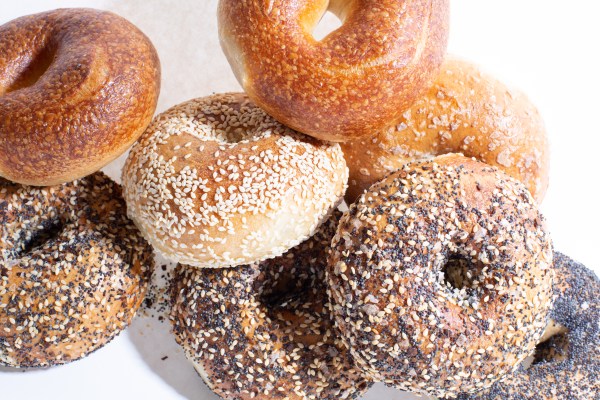I’m a bit of a bagel snob. I once baked bagels overnight with the crew at Better Bagels for a profile on its founders back in college. I occasionally bake them at home and still go to my childhood bagel shop, Abraham’s, practically every time I’m in New England. I keep a sesame bagel from Feltz Bagels on my desk.
Bagels carry a certain nostalgia for me. I have core childhood memories of driving to Abraham’s with my dad and sister, picking up a dozen bagels, and ripping apart a fresh one to share on the drive home.
So when I saw that Popup Bagels, a mom-and-pop-looking bagel shop chain, raised venture capital, I was like . . . what? Isn’t this literally what small business loans are for? Popup Bagels raised an $8 million Series A led by Stripes, with participation from Habitat Partners and Tastemaker Capital.
Sure, BetterBrand, a startup that makes high-protein bagels with suspiciously low amounts of carbs, recently raised $6 million in venture funding. But they are an e-commerce food tech company, and that has VC written all over it. Not a place to go buy a bagel in person.
Popup Bagels’ founder Adam Goldberg sees it differently, though. He told TechCrunch+ that he’s not interested in ever taking on debt — good luck with that — and venture capital makes sense because Popup has strong demand, runs a lean operation and is looking to grow rapidly. Two of the backers — Stripes and Tastemaker Capital — have experience scaling food startups, too.
“When you are disrupting an industry, and have something that is new and exciting, and people are stoked to try it, it is great to have capital to roll out fast and it is also great to have smart people behind that capital,” Goldberg said. “We turned down a lot of people who wanted to write a check that didn’t really help. Stripes has experience in doing these roll-outs.”
Taking a closer look, some of that definitely rings true.
All of Popup’s six locations are small-format stores that employ few workers and largely serve as outlets where folks can grab their bagels — which are only sold whole in quantities of three, six or a dozen — and go. If this sounds a bit like Blank Street Coffee, it definitely is, and that company also confuses me as a target for venture capital.
The key here that makes Popup seem more like a venture-backable business is its focus and lean operations. Bagels are pretty simple, ingredient-wise, and Popup has only four varieties, which likely keeps costs low on the front end. They bake the bagels every 10 minutes depending on demand, so they sell out every day and don’t have any waste.
Plus, the bagels are quite good. Of course I bought some, come on! Goldberg had me try one fresh, just ripped apart. It had a strong crunch on the outside and the ideal soft and fluffy texture on the inside. Sorry, Montreal. If there were an outlet near where I lived, I’d definitely add it to my rotation.
But this business, in many ways, has scaled due to its own hype. It’s won awards at multiple Brooklyn Bagel festivals and has had celebrities and athletes singing its praises. While it’s possible for companies to cultivate a strong and loyal customer base to sustain them after the hype fades —it always will — it’s pretty difficult to pull off, regardless of how good your product is. Especially if you’re a bagel company with plans to expand in New York and the Northeast — good bagels aren’t exactly scarce here.
Goldberg talked about how it’s not uncommon to see long lines at the company’s outlets. Sure, it’s a sign of demand, but not longevity. If you saw that the U.S. ski team was going to be there running the counter — which was happening when I visited on Thursday — sure, you’d be willing to wait in line. But are you going to do that every time you crave a bagel?
Also, the company only offers four bagels, in addition to various and sometimes limited edition schmears, which could cut some customers out. If someone was looking for a bagel sandwich, a toasted bagel to go or a coffee, this brand isn’t an option.
But maybe Popup’s focus on selling bags of fresh bagels taps into a niche of customers. The company could certainly find a strong enough base in New York and garner a following in places where there aren’t as many potential options. The bagels are good, after all. But it’s going to be hard.
“I say with confidence: We are making a great product that feels good after you eat it, that feels good when you are purchasing it and picking it up,” Goldberg said. “We want you to enjoy that.”
Hopefully, that’s enough.
